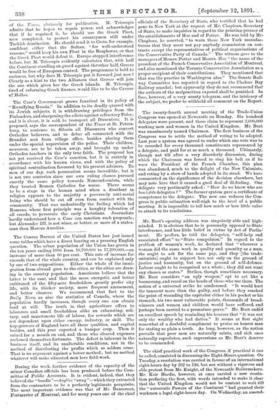Mr. Burt's opening address was singularly able and high- minded.
It is obvious that he is personally opposed to State interference, and has little belief in virtue by Act of Parlia: ment. He prefers, he told the delegates, " self-help and associated effort" to "State compulsion." In regard to the problem of- women's work, he declared that " wherever a woman did the same work in quality and quantity as a man, she ought to ask for the same pay, and they [the trade- unionists] ought to support her, not only on the ground of justice and humanity, but on the ground of self-defence. Labour ought to be recognised as a whole ; they did not want any classes or castes." Strikes, though sometimes necessary, Mr. Burt considers "an ugly weapon," apt to act like a boomerang, and recoil on the heads of those who use them. The notion of a universal strike he condemned. "It would hurt the innocent more than the guilty, and before they reached the point of wounding the capitalist either in his pocket or his- stomach, his two most vulnerable points, thousands of bread- winners and women and children would have suffered, and perhaps been carried to a premature grave." Mr. But ended an excellent speech by reminding his hearers that " it was not only the wealthy who had duties." It seems at first sight somewhat of a doubtful compliment to praise an honest man for stating so plain a truth. As long, however, as the notion prevails that poor men are naturally saints, and rich ones naturally reprobates, such expressions as Mr. Burt's deserve to be commended.


































 Previous page
Previous page